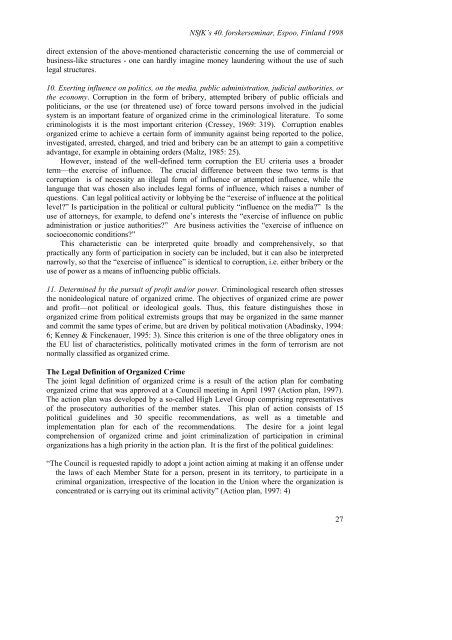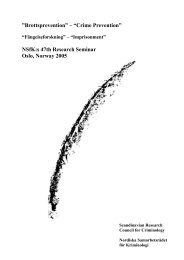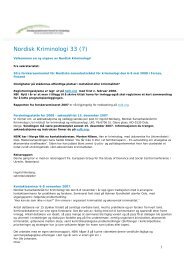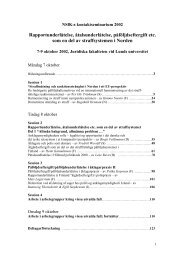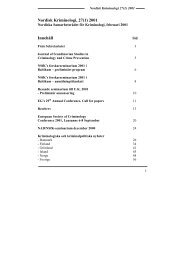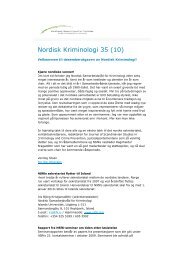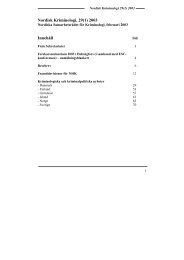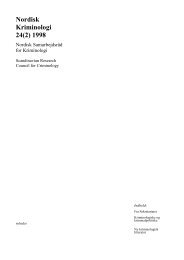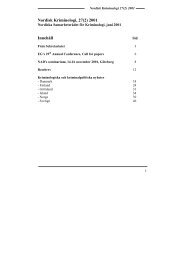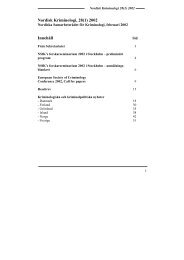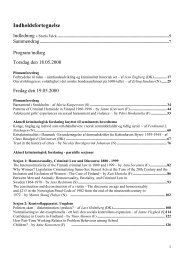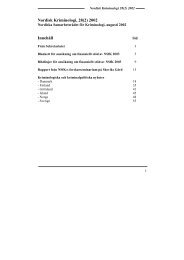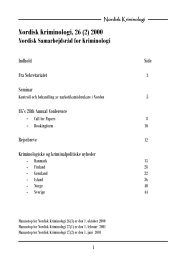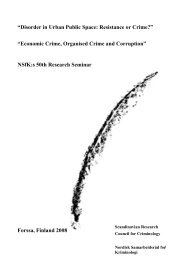Organised Crime & Crime Prevention - what works? - Scandinavian ...
Organised Crime & Crime Prevention - what works? - Scandinavian ...
Organised Crime & Crime Prevention - what works? - Scandinavian ...
You also want an ePaper? Increase the reach of your titles
YUMPU automatically turns print PDFs into web optimized ePapers that Google loves.
NSfK’s 40. forskerseminar, Espoo, Finland 1998<br />
direct extension of the above-mentioned characteristic concerning the use of commercial or<br />
business-like structures - one can hardly imagine money laundering without the use of such<br />
legal structures.<br />
10. Exerting influence on politics, on the media, public administration, judicial authorities, or<br />
the economy. Corruption in the form of bribery, attempted bribery of public officials and<br />
politicians, or the use (or threatened use) of force toward persons involved in the judicial<br />
system is an important feature of organized crime in the criminological literature. To some<br />
criminologists it is the most important criterion (Cressey, 1969: 319). Corruption enables<br />
organized crime to achieve a certain form of immunity against being reported to the police,<br />
investigated, arrested, charged, and tried and bribery can be an attempt to gain a competitive<br />
advantage, for example in obtaining orders (Maltz, 1985: 25).<br />
However, instead of the well-defined term corruption the EU criteria uses a broader<br />
term—the exercise of influence. The crucial difference between these two terms is that<br />
corruption is of necessity an illegal form of influence or attempted influence, while the<br />
language that was chosen also includes legal forms of influence, which raises a number of<br />
questions. Can legal political activity or lobbying be the “exercise of influence at the political<br />
level?” Is participation in the political or cultural publicity “influence on the media?” Is the<br />
use of attorneys, for example, to defend one’s interests the “exercise of influence on public<br />
administration or justice authorities?” Are business activities the “exercise of influence on<br />
socioeconomic conditions?”<br />
This characteristic can be interpreted quite broadly and comprehensively, so that<br />
practically any form of participation in society can be included, but it can also be interpreted<br />
narrowly, so that the “exercise of influence” is identical to corruption, i.e. either bribery or the<br />
use of power as a means of influencing public officials.<br />
11. Determined by the pursuit of profit and/or power. Criminological research often stresses<br />
the nonideological nature of organized crime. The objectives of organized crime are power<br />
and profit—not political or ideological goals. Thus, this feature distinguishes those in<br />
organized crime from political extremists groups that may be organized in the same manner<br />
and commit the same types of crime, but are driven by political motivation (Abadinsky, 1994:<br />
6; Kenney & Finckenauer, 1995: 3). Since this criterion is one of the three obligatory ones in<br />
the EU list of characteristics, politically motivated crimes in the form of terrorism are not<br />
normally classified as organized crime.<br />
The Legal Definition of Organized <strong>Crime</strong><br />
The joint legal definition of organized crime is a result of the action plan for combating<br />
organized crime that was approved at a Council meeting in April 1997 (Action plan, 1997).<br />
The action plan was developed by a so-called High Level Group comprising representatives<br />
of the prosecutory authorities of the member states. This plan of action consists of 15<br />
political guidelines and 30 specific recommendations, as well as a timetable and<br />
implementation plan for each of the recommendations. The desire for a joint legal<br />
comprehension of organized crime and joint criminalization of participation in criminal<br />
organizations has a high priority in the action plan. It is the first of the political guidelines:<br />
“The Council is requested rapidly to adopt a joint action aiming at making it an offense under<br />
the laws of each Member State for a person, present in its territory, to participate in a<br />
criminal organization, irrespective of the location in the Union where the organization is<br />
concentrated or is carrying out its criminal activity” (Action plan, 1997: 4)<br />
27


